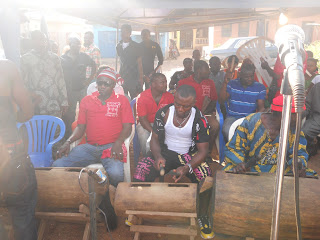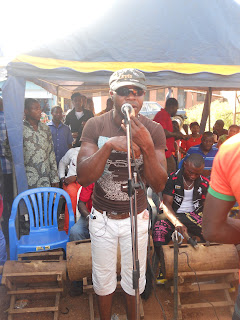PRINCE EDINGENE WITH GROUPS
AGU EWE OYI IN ACTION
SAMANJA IZUOGU IN SPIRIT
Thursday, April 4, 2013
Thursday, March 14, 2013
IKEJI DATE GOES OFFICIAL
wow here come the date of 2013 IKEJI festival which will start from 11th of April 2013,we thank the general eze's for the awesome date they gave us,in fact that date was cool because it falls on weekend, so all the workers won't have any excuses why they did not come back for this great festival.
i was ask to say a very big thanks to eze iheme, no other person than HRH EZE KOSSMAN NDUBUISE KANU and all the AKAJIOFOR'S for making this date a reality may God bless all of you in Jesus name amen
i was ask to say a very big thanks to eze iheme, no other person than HRH EZE KOSSMAN NDUBUISE KANU and all the AKAJIOFOR'S for making this date a reality may God bless all of you in Jesus name amen
Wednesday, March 13, 2013
PRAYER FOR UPCOMING IKEJI FESTIVAL
preparing IKEJI festival this year without praying and fasting to
greatest almighty God for his mercy and divine guidance is inhuman and
selfish because anything can happen..........please join me as i pray
for us for a merciful IKEJI festival this season.......God is never
against our festival but he is only against the evil and selfish things
that is been practiced on it.lets pray that is as we prepare that god
shall see us through and nobody will loose his or her life this season
in Jesus name we pray....amen
thanks.
Nwa mazi
EPHRAIM OKPALEKE
thanks.
Nwa mazi
EPHRAIM OKPALEKE
greetings to all UMU MAZI all over the word who always visit the blog for update,well am pleased to inform you all that its remaining a day to go for the decision on the date of IKEJI IZUOGU to be made official to all UMU MAZI....the EZE'S and the AKAJIOFOR'S will be celebrating ikeji iheme tomorrow being 14th MARCH which after, the date will be announce to everybody..............i urge all UMU MAZI to get ready because this year IKEJI will be best among all, why i said this is because i can perceive the smell and fresh breeze of IKEJI please try and be there or better still get more information here and some pics also.
thanks
thanks
Wednesday, February 27, 2013
MAZI ONYEKA IJITA POINTS HIS VIEW ABOUT CULTURE
Ikeji Arondizuogu Our Tradition, Our culture, our Heritage.[Part one]
Ndizuogu, our culture is our heritage, and it is one of the
things that can be attributed as being unique to us
Tradition is not bad, Adhering to your
culture and tradition does not make you to loose sight with God
I am a christian, and my English
name is christian, but i like tradition, i have no problem with traditional medicine, neither do i have a problem with saying a
prayer in a traditional way (igo ofo). It is what is in your mind.
We need to
start disabusing our minds this idea that our tradition is bad, because
it is not bad. There are areas we need to evolve on, and we have to.
But there are areas where we can integrate our modern lifestyles with
our culture, history and tradition
I am not telling anyone to go and
worship traditional god, but i cannot convince anyone that God only
answers prayers that are said in a certain way------By Mazi Onyeka Ijita
Reminiscences Of Arondizuogu Cultural Festival
ANDREW
IRO OKUNGBOWA who witnessed the just celebrated 2012 Ikeji Festival in
Arondizuogu, writes on the tourist attractions of the community, the
ancestral home of Arochukwu people in the South Eastern part of Nigeria.
THE people of Arochukwu were in joyous mood on the occasion of the celebration of this year’s Ikeji Festival with Arondizuogu, their ancestral home, radiating all colors of the rainbow.
The yearly festival has over the years grown to be a huge socio-cultural and religious celebration of the people, which is about thanksgiving, propitiation and feasting.
The masquerades gyrate to fascinating and enchanting rhythms and pulsating beats. They are accompanied by a retinue of performers ranging from drummers (ekwe - wooden slit drums), ogene (metal gong), bells, maracas and oja (wooden flutes).
It is celebrated within four traditional days known as Eke, Oye/Orie, Afo and Nkwo and the days they are packed full with different traditional activities holding at the various communities which foster unity among the people.
Historically, Arondizuogu is believed to have been founded around the 18th century by Mazi Izuogu, a slave merchant from Arochukwu and Chief Iheme who was his chief servant . Izuogu came from a place known as Isi-Akpu Nise in Akwa, Anambra State. Over time, Izuogu and his people (Ndizuogu) united with Iheme and his people (Ndiheme) to form the Aro kingdom of Arondizuogu.
Arondizuogu people are referred to as “Izuogu na Iheme,” and occupy about 20 villages and 12 autonomous communities. Each autonomous community has its own ‘Eze’ (traditional ruler recognized by the state government). The communities are - Ndiuche Autonomous Community, Awa Izuogu Autonomous Community, Ndiheme Autonomous Community, Aro-Umuduru Autonomous Community, Aro-Amuro Autonomous Community, Ejezie Izuogu Autonomous Community, Akeme Autonomous Community, And Ndiogbunoyema Autonomous Community.
THE people of Arochukwu were in joyous mood on the occasion of the celebration of this year’s Ikeji Festival with Arondizuogu, their ancestral home, radiating all colors of the rainbow.
The yearly festival has over the years grown to be a huge socio-cultural and religious celebration of the people, which is about thanksgiving, propitiation and feasting.
The masquerades gyrate to fascinating and enchanting rhythms and pulsating beats. They are accompanied by a retinue of performers ranging from drummers (ekwe - wooden slit drums), ogene (metal gong), bells, maracas and oja (wooden flutes).
It is celebrated within four traditional days known as Eke, Oye/Orie, Afo and Nkwo and the days they are packed full with different traditional activities holding at the various communities which foster unity among the people.
Historically, Arondizuogu is believed to have been founded around the 18th century by Mazi Izuogu, a slave merchant from Arochukwu and Chief Iheme who was his chief servant . Izuogu came from a place known as Isi-Akpu Nise in Akwa, Anambra State. Over time, Izuogu and his people (Ndizuogu) united with Iheme and his people (Ndiheme) to form the Aro kingdom of Arondizuogu.
Arondizuogu people are referred to as “Izuogu na Iheme,” and occupy about 20 villages and 12 autonomous communities. Each autonomous community has its own ‘Eze’ (traditional ruler recognized by the state government). The communities are - Ndiuche Autonomous Community, Awa Izuogu Autonomous Community, Ndiheme Autonomous Community, Aro-Umuduru Autonomous Community, Aro-Amuro Autonomous Community, Ejezie Izuogu Autonomous Community, Akeme Autonomous Community, And Ndiogbunoyema Autonomous Community.
Arondizuogu Patriotic Union (APU),
founded in 1932 in Aba, is an umbrella organisation for all Arondizuogu
people and those in the diaspora. The body is devoted to the development
of the people and the various communities. It is presently headed by
Barrister Uche Ohia from Ndiakeme Ohiauchu. He was elected on October
25, 2008.
Tourist Attractions
Besides the Ikeji Festival which has become a major tourist event, Arondizuogu harbours a number of attractions, especially of historical, religious and cultural inclinations. The list is endless but here are samples of what to feast on when in the ancient enclave.
Mazi Mbonu Ojike Cottage: The country home of Mazi Mbonu Ojike, who was popular for his political sagacity and widely known within his community and beyond as ‘The boycott king.’ He is from Ndiakeme Uno.
Uno Ogologo: A Safe House built in 1887 for hiding children during the slave trade era by one of the slave merchants.
Stone Palace: A one-storey architectural masterpiece cast in stone constructed by the late Chief Green Mbadiwe. Built for his father, Mbadiwe Odum, at Ndianiche Uno, the ancient building is amazing to behold considering the technology of the era it was built.
Ngeze: A legendary stream at Ndiakeme Uno.
Ogbuti Ezumezu (Obi Pericomo): Houses the musical instruments of Pericomme Okoye who was highly regarded then as Ikeji music maestro, Ndiogbuonyeoma Ofe Imo.
National High School, Arondizuogu: A model school built through communal effort and commissioned in 1951 at Ndiakeme uno.
Iheme Memorial Secondary School: Another model school built in 1951 at Ndianiche through communal effort.
Palace Of The People: Another and awe- inspiring structure built by Dr. Kingsley.O. Mbadiwe (Agadagbachiriuzo) at Ndianiche. The late Prime Minister of Nigeria, Alhaji Tafawa Balewa, commissioned it in 1965.
Upiti: An expansive rice field at Akeme Ohiauchu.
Obi Omenuko: Country home of Igwegbe Odum, the hero of Omenuko, the first Igbo novel by Pita Nwana.
Ngene Okwe: A natural spring at Ndiawa.
Obi Ezerioha: Located in Obiokwara, Obinihu (Agbualla) Umualaoma, it holds historical significance for the people, as it was the place where the peace agreement that fostered the unity and peaceful co-existence of the people was signed by their forebears.
Tourist Attractions
Besides the Ikeji Festival which has become a major tourist event, Arondizuogu harbours a number of attractions, especially of historical, religious and cultural inclinations. The list is endless but here are samples of what to feast on when in the ancient enclave.
Mazi Mbonu Ojike Cottage: The country home of Mazi Mbonu Ojike, who was popular for his political sagacity and widely known within his community and beyond as ‘The boycott king.’ He is from Ndiakeme Uno.
Uno Ogologo: A Safe House built in 1887 for hiding children during the slave trade era by one of the slave merchants.
Stone Palace: A one-storey architectural masterpiece cast in stone constructed by the late Chief Green Mbadiwe. Built for his father, Mbadiwe Odum, at Ndianiche Uno, the ancient building is amazing to behold considering the technology of the era it was built.
Ngeze: A legendary stream at Ndiakeme Uno.
Ogbuti Ezumezu (Obi Pericomo): Houses the musical instruments of Pericomme Okoye who was highly regarded then as Ikeji music maestro, Ndiogbuonyeoma Ofe Imo.
National High School, Arondizuogu: A model school built through communal effort and commissioned in 1951 at Ndiakeme uno.
Iheme Memorial Secondary School: Another model school built in 1951 at Ndianiche through communal effort.
Palace Of The People: Another and awe- inspiring structure built by Dr. Kingsley.O. Mbadiwe (Agadagbachiriuzo) at Ndianiche. The late Prime Minister of Nigeria, Alhaji Tafawa Balewa, commissioned it in 1965.
Upiti: An expansive rice field at Akeme Ohiauchu.
Obi Omenuko: Country home of Igwegbe Odum, the hero of Omenuko, the first Igbo novel by Pita Nwana.
Ngene Okwe: A natural spring at Ndiawa.
Obi Ezerioha: Located in Obiokwara, Obinihu (Agbualla) Umualaoma, it holds historical significance for the people, as it was the place where the peace agreement that fostered the unity and peaceful co-existence of the people was signed by their forebears.
Monday, February 25, 2013
 |
| AGUBA (AKAEME) |
 |
| AGUNZI IZUOGU (NDI AMAZU) |
 | ||
| OKONTA( AKEME OHIAUCHU) |
ikeji is a festival of joy,the period you see and meet people you have not seen for decades and the period you feel the natural air of you home town and not the air that comes from hustling town..........I so much believe in God and i respect him as ma father and creator....please lets join hands together and promote our culture inheritances....thank you
FESTIVALS IN NIGERIA
|
|
||||||||||||||||||||||||||
Sunday, February 24, 2013
the top masquerade in izuogu
Subscribe to:
Comments (Atom)



































